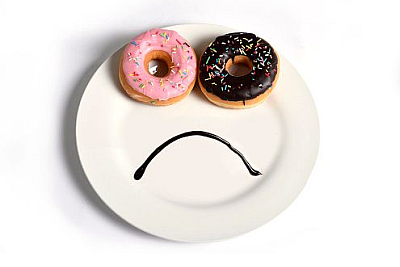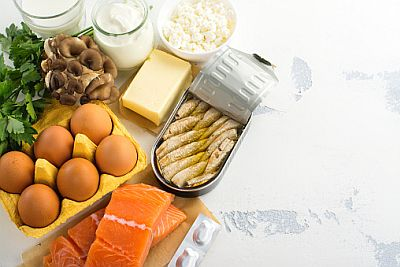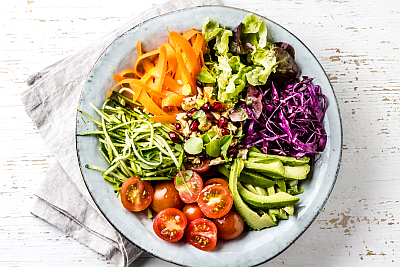Make the Food-Mood Connection
Your energy’s running low and your tummy’s rumbling. Gut check: You’re feeling the telltale signs of hunger. But sometimes that hunger takes on a life of its own, making you irritable and impatient. And so the word “hangry” (hungry + angry) was born.
 “Most people understand food’s effect on physical health. But there is also a relationship between what you eat and your state of mind,” says Aramark Registered Dietitian Susan Zikos. “This food-mood connection largely comes down to blood sugar levels and its effect on your brain.”
“Most people understand food’s effect on physical health. But there is also a relationship between what you eat and your state of mind,” says Aramark Registered Dietitian Susan Zikos. “This food-mood connection largely comes down to blood sugar levels and its effect on your brain.”
Case in point: You might be tempted to re-energize with the first available bite but if you reach for a candy bar or donut instead of a main meal or healthy snack, you’re setting yourself up for a blood sugar crash an hour later. If you are what you eat, as the saying goes, then why not reach for foods that will make you feel good and satisfied?
We chatted with Susan to learn which foods make the best pick-me-ups, plus other tips for keeping “hanger” at bay.
- Count on carbs. Long story short, the carbohydrates you eat become glucose, which gives your body energy to burn from head to toe. “Carbs are your brain’s primary and preferred energy source. It’s hard to think clearly or concentrate if you don’t get enough,” Susan explains. For energy that lasts, seek out fiber-filled options like whole grains, fresh fruit, vegetables, beans or nuts whenever possible.
 On the other hand, refined sugar and starches—found in candy, pastries, regular soda, white rice and bread, to name a few examples—can cause your blood sugar to go up and down like a rollercoaster. “These drops in blood sugar can leave you with that tired, cranky feeling,” she says.
On the other hand, refined sugar and starches—found in candy, pastries, regular soda, white rice and bread, to name a few examples—can cause your blood sugar to go up and down like a rollercoaster. “These drops in blood sugar can leave you with that tired, cranky feeling,” she says. - Keep it steady with protein. “When you eat protein, it slows down the absorption of carbohydrates, stabilizing your blood sugar levels,” Susan states. This keeps your brain stimulated and your stomach fuller for longer. Eggs, poultry, seafood, tofu, seeds, nuts and nut-butters are great sources of protein packed foods. Protein-rich foods also tend to be high in B vitamins, which help convert food into energy and produce red blood cells, which carry oxygen throughout the body.

- Choose fats wisely. As we’ve learned, not all fats are created equal. Limit saturated fats and steer clear of transfats, which can cause inflammation in the body. That inflammation increases the likelihood of fatigue. Focus instead on healthy fats (poly- and monounsaturated) like omega-3s that are important for proper brain function. “The brain is made up of nearly 60% fat so it’s no surprise that fatty acids are intimately linked to brain health,” Susan advises. “You can find good fatty acids in foods like salmon, avocados, nuts, and seeds.”
- Don’t skip meals. Now that you know about the role of the three macronutrients, aim to eat a combination of them every two to three hours. When life gets busy, too many of us rush out the door without breakfast or work through lunch.“If you skip a meal, chances are you’ll just overeat at the next one,” warns Susan. “Eat regular meals and snacks throughout the day to keep from getting too hungry.” Another pro tip: Set a regular meal and snack schedule. Eating at about the same time every day assures that your body has a continuous source of fuel, which will fend off those troublesome drops in blood sugar.

- Pick up some produce. Yet another reason to get your five a day: Colorful fruits and vegetables contain important vitamins, minerals, and antioxidants critical for brain function. “Getting too little of any one nutrient will make you feel fatigued,” Susan explains. “Eat the rainbow and you’re well on your way to covering the bases.” What’s more, fruits and veggies contain as much as 96% water.
- Drink up. Which brings our RD to another feel-good tip: Stay hydrated. Dehydration can mess with your concentration and reduce your reaction time. Again, smart snacks can count toward your water goals, and drinking plenty of water is a surefire way to lift your spirits. “If you like, throw in some herbs or fruit slices to make plain water more interesting,” Susan suggests.
- Go easy on caffeine and alcohol. Unsweetened coffee and tea are wise beverage choices, too, but keep track of how much caffeine you’re drinking. “In addition to dehydration, drinking very large amounts of coffee can cause sleeplessness,” Susan clarifies. Consuming it late in the day can also make it hard for you to fall and stay asleep.Same goes for alcohol: It dehydrates you, can affect your quality of sleep, and often comes with a high sugar content—and that’s even before you add sugar-laden mixers like soda and juice.

- Get physical. You don’t have to experience “runner’s high” to know that exercise can be a real stress reliever. “Physical activity releases endorphins, your body’s natural mood-booster. It also increases feel-good hormones like serotonin, dopamine, and norepinephrine,” says Susan. We can’t underestimate the effects that a little sunshine and fresh air can have on your mood such as decreasing your blood pressure and heart rate, so get outside! Schedule a mix of cardio sessions (three to five) and strength training sessions (two or more) each week to keep your heart rate and mood elevated.
New Mood State of Mind
When you’re mindful about your food choices, it has a positive effect on your well-being. Follow the tips outlined here to fuel your potential in both body and mind.
“A good mood makes it so much easier to take on the day,” Susan reminds us. “When you’re calm and even-keeled, one healthy food choice leads to another, and you can avoid the mood swings that come from being hungry or ‘hangry.’”
Now, that’s something to be happy about!
Access this article and other Feed Your Potential articles here: http://www.fyp365.com/make-the-food-mood-connection/?sf98074296=1